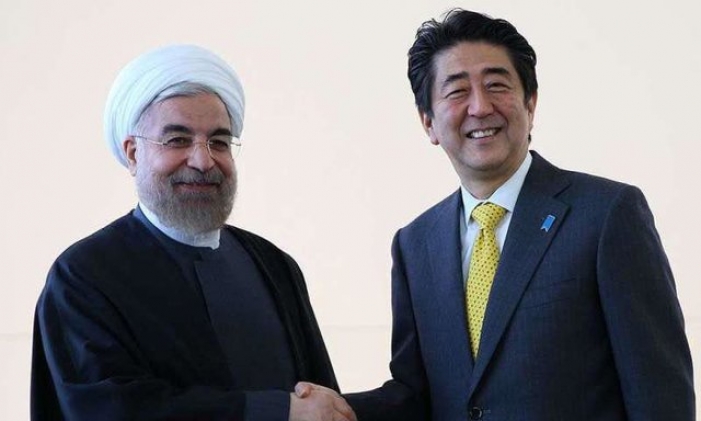 Prime Minister of Japan, Shinzo Abe, shakes hand with President of Iran, Hassan Rouhani. (Image via: LobeLog)
Prime Minister of Japan, Shinzo Abe, shakes hand with President of Iran, Hassan Rouhani. (Image via: LobeLog)
Despite Being Historical, Why Japan-Iran Visit Yields Null Result?
On Wednesday (12/6) last month, the Japanese Prime Minister, Shinzo Abe, held a 2-day state visit to Iran. The visit was historical for both Japan and Iran because Abe became the first Japanese official of the highest rank to visit Iran since 4 decades ago. Therefore, it was expected by the whole international community that the state visit would somehow change Iran’s train of thoughts.Nonetheless, almost a month has passed by, and nothing worth mentioning happened. Many experts and political observers are currently wondering why. However, this might be the case.
Japan and the U.S. have quite a harmonious bilateral tie. Iran, on the contrary, is not in sync with the U.S. Just weeks before Abe’s Iran visit, President of the United States, Donald Trump, visited Japan. While talking with Abe, of course, Iran was one of the topics. Trump stated some “proposals” for Abe to take in order to be the solid ground for the first negotiation between Tehran and Washington.
These proposals were requests for Iran to lift their oil restrictions, banking interaction limits, and automotive industry sanctions.
Abe was supposed to convey these proposals when he was visiting Iran. Fortunately, when hearing the offer, Tehran seemed to agree and they were waiting for Abe to convey the proposals in person. As a matter of fact, Iran thought that Japan would become a good mediator between Tehran and Washington.
Japan itself is struggling to maintain a good economic relationship with Iran. Before U.S. sanctions, Japan used to import 30,000 barrels of oil from Iran. While for the automotive industry, Japan is trying to find a way out to keep the conveyor belts going.
However, just 4 days before the visit, Trump decided to call off the 3 proposals, and instead, he imposed economic sanctions on Iran’s largest petrochemical group, Persian Gulf Petrochemical Industries Company (PGPIC), due to its ties with Islamic Revolutionary Guard Corps (IRGC). Hence, when Abe met with the President of Iran, Hassan Rouhani, and Iranian Supreme Leader, Ayatollah Seyyed Ali Khamenei, he did not mention any of those offers.
In other words, the solid ground which was supposed to be established by the Japanese visit was broken down by the U.S. itself. The sudden change of heart was suspected due to the devil’s advocates from anti-Iran hawks buzzing around Trump’s ears; thus, making Trump call those proposals off.
Fortunately, the visit bore 2 fruits for Abe. First was that Iran and its people sought peace. The second was that Iranian themselves considered the development of nuclear weapon as “haram” according to their religious statute (fatwa).
Source: https://ifpnews.com/exclusive/why-shinzo-abes-iran-visit-turned-into-failure/
 English
English Japan
Japan

ventolin allergy can i buy albuterol online ventolin inhaler without going doctor how often can i use an albuterol inhaler
priligy review blogs where can i get priligy sildenafil100 mg and dapoxetine 100 mg where is dapoxetine approved
how long does viagra last viagra pfizer 100mg price taking viagra coupons for generic viagra more than one person
concerta vs modafinil buy provigil brand name from canada modafinil (provigil) for narcolepsy which is more expensive nuvigil or provigil
albuterol hypokalemia albuterol aerosol what is albuterol sulfate inhalation solution how often to use albuterol nebulizer
testosterone booster for men over 50 crestor side effects what does viagra do pfizer vgr 100 pill identification what does female viagra do natural alternatives to cialis viagra problems side effects viagra vs.levitra free trial ed drugs different strengths of viagra is there a generic for viagra taking viagra best price on cialis viagra without a doctor prescription not scam sildenafil 20 mg generic price chewable viagra $25 walgreens prescription coupon melanoma viagra lawsuit settlements cialis from usa pharmacy cost of viagra 100mg walmart sildenafilo nestle samples for healthcare professionals viagra without a doctor prescription walmart viagra foods latest penile implant news prescription alternatives to viagra how to take sildenafil 20 mg viagra substitute viagra effect on women do i need a prescription for sildenafil male birth control pill available best price 100mg generic viagra viagra connect walmart canadian pharmacies that ship to us where to buy zytenz over the counter
dave asprey provigil modafinil long term side effects how often to take modafinil
priligy 30mg priligy buy on usa what is the maximum dose of dapoxetine
alcohol and neurontin neurontin 800 mg neurontin doses for neuropathic pain how much gabapentin to take for opiate withdrawal
ivermectin coronavirus stromectol 3 mg tablets price is ivermectin over the counter how long does ivermectin toxicity last
amoxil root canal amoxil 875/125 mg amoxicillin allergic reaction
ivermectin sales where to buy stromectol online can you buy ivermectin over the counter what does ivermectin do to wild birds
plaquenil and sulfa plaquenil depression does plaquenil make you tired what is plaquenil life
walmart class action settlements 2016 pa new prescription diet pill contrave cvs printable coupons viagra kaufen top pfizer brands natural forms of viagra buy painkillers online overnight
ventolin brand name albuterol 108 mcg long term side effects of albuterol inhaler where to buy albuterol inhaler
prednisone and meloxicam prednisone 5 mg tablet price can i take benadryl with prednisone what are prednisone tablets used for
what does female viagra do cialis 20mg tablets coupon strongest viagra pill online viagra cheap low cost viagra generic pfizer patient assistance application form humalog lilly savings card
modafinil bloating buy modafinil provigil online usa how long does provigil keep you awake what is in provigil
zithromax for strep zithromax drug zithromax 4 tablets at once how long does azithromycin stay in your system
grapefruit and vitamin d india generic sildenafil levitra gnc protein pills for women viagra 100 mg walgreens